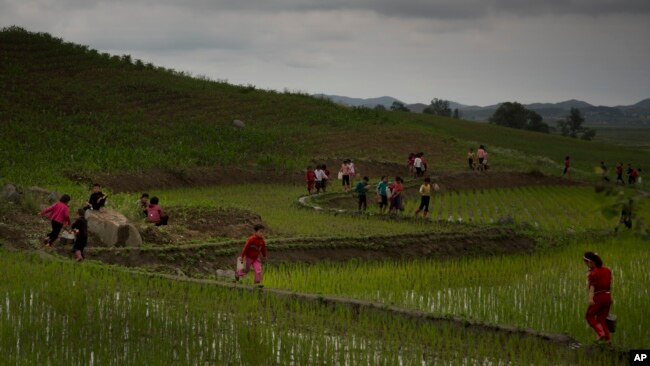[뉴스 동서남북] 유엔 보고서, 북한 주민 53.7% ‘농지 보유’
[뉴스 동서남북] 유엔 보고서, 북한 주민 53.7% ‘농지 보유’
2018.8.6
최원기
 지난 2014년 북한 평양 인근 논에서 학생들이 농사 일을 돕고 있다. (자료사진)
지난 2014년 북한 평양 인근 논에서 학생들이 농사 일을 돕고 있다. (자료사진)공유
매주 월요일 한반도 주요 뉴스의 배경과 의미를 살펴보는 ‘쉬운 뉴스 흥미로운 소식: 뉴스 동서남북’ 입니다. 북한 주민들의 살림살이 실태를 보여주는 유엔 보고서가 나왔습니다. 유엔아동기금, 유니세프(UNICEF)가 최근 발표한 북한 민생 실태 자료에 따르면 북한 가구 53.7%가 농지를 보유하고 있는 것으로 나타났습니다. 최원기 기자가 전해 드립니다.
유엔이 최근 북한 주민들의 농지 보유부터 냉장고, 전기밥솥, 휴대전화에 이르기까지 구체적인 민생 실태 자료를 공개했습니다.
유니세프가 발표한 ‘2017년 북한 다중지표군집조사(MICS)’ 보고서는 개발도상국에 대한 유엔의 민생 실태 조사로, 북한에서의 조사는 1998년과 2000년, 그리고 2009년에 이어 2017년에 네 번째로 실시됐습니다.
북한 주민들의 생활상 조사는 조사 항목이 117개로 방대할 뿐 아니라 상당히 체계적으로 진행됐습니다. 조사는 북한의 중앙통계국이 유니세프의 지원을 받아 북한 전역 8천500여 가구 주민들을 대상으로 실시했습니다.
유엔 인도주의업무조정국의 마크 로우코크 국장은 `VOA'에, 북한 통계국의 협력을 받아 북한 전역에서 주민 영양 상태 등 설문조사를 했다고 말했습니다.
[녹취: 로우코크] "Access is improving, Unicef...."
이번 보고서에서 가장 눈길을 끄는 것은 53.7%의 가구가 농지를 보유하고 있다는 대목입니다. 유엔은 개별 가구와 개인의 재산 현황을 파악하기 위해 설문에 ‘농지가 있느냐’는 질문을 포함했는데, 절반 이상이 농지가 있다고 대답한 겁니다.
농지 보유는 지역별로 다소 편차가 있습니다. 조사는 평양을 포함해 10개 지역에서 이뤄졌는데, 농지 보유 비율이 가장 높은 곳은 황해남도로 68.5%로 나타났습니다. 이어 64.8%를 기록한 함경남도와 황해북도(62.6%), 평안북도(62.5%), 자강도(59.7%), 양강도 (54.8%), 강원도(54.4%), 평안남도(53.4%), 함경북도(48.1%) 순으로 나타났습니다. 농지 보유 비율이 가장 낮은 지역은 평양으로 18.8%였습니다.
한국 내 탈북자들은 북한 주민들의 농지 보유에 대해 믿기 어렵다는 반응을 보였습니다. 북한은 1946년 토지개혁 이래 모든 토지를 국가 소유로 했기 때문에 원칙적으로 농지를 소유할 수 없다는 겁니다.
북한 농업과학원에 근무하다 1990년대 한국으로 망명한 이민복 씨는 농지 보유라는 것이 뙈기 밭을 의미하는 것 같다고 말했습니다.
[녹취: 이민복] ”53%라는 것이 개인 뙈기 밭, 텃밭을 얘기하는 것 같아요, 제가 있을 때도 1천평, 500평씩 하는 사람이 있었어요.”
뙈기 밭은 협동농장에서 가구 별로 나눠준 작은 밭을 말합니다. 주민들은 여기에 배추나 무, 고추, 호박 등을 심어 먹습니다.
또 다른 탈북자들은 농지 보유가 ‘분조제’를 의미하는 것일 수 있다고 말했습니다. 북한 당국은 2012년부터 논과 밭을 분조별로 나눠주는 새로운 영농 방식을 도입했는데, 이 것이 농지 보유를 의미할 수 있다는 겁니다. 평안북도 신의주에 살다가 2011년 한국에 입국한 김수진 씨입니다.
[녹취: 김수진] ”분조관리제의 방침에 따라 1천-3천평의 땅을 대여해준 거죠, 국가에서, 봄에 땅을 대여해서 농사해서 60%를 바치고, 나머지는 너희들이 먹어라는 건데, 1-3천평을 땅을 받았다는 내용을 양강도나 김정숙군 사람과 통화해 들었거든요.”
북한에서 ‘가족분조제’ ’포전담당제’ ’6.28 방침’등으로 불리는 이 분조제의 핵심은 농민들에게 일한 만큼 그에 따른 보상을 주는 겁니다.
과거에는 협동농장에서 10t의 쌀을 생산하면 국가에 토지사용료와 물, 전기, 비료, 농약 대금조로 5t을 납부하고 나머지를 ‘평균주의’ 원칙에 따라 농민들에게 현금으로 분배했습니다.
따라서 농민 입장에서는 일을 열심히 하든 적당히 하든 소득이 비슷해 근로 의욕이 생기지 않았습니다. 게다가 북한 돈의 가치가 떨어져 몇 만원을 받아도 장마당에서 물건을 살 수 없었습니다.
그러나 새로운 분조제에서는 15t을 생산할 경우 국가에 10t을 납부하고 나머지 5t은 분조원들이 실적에 따라 자율적으로 처분할 수 있습니다. 북한 관영 `조선중앙방송'입니다.
[녹취: 중방 ] “분조에서 생산한 알곡 가운데서 국가가 정한 일정한 몫을 제외한 나머지는 농장원들에게 그들이 번 노력 일에 따라 현물을 기본으로 하여 분배하도록 하여야 합니다.”
한편 북한에서는 지난 20년 간 장마당을 중심으로 시장경제가 작동하면서 주민들 사이에 빈부격차도 커지는 것으로 나타났습니다.
유엔의 이번 조사 결과 평양의 경우 응답자의 89.7%가 휴대전화가 있다고 답했습니다. 그러나 황해북도는 51.2%에 불과했습니다.
또 냉장고는 평양 가구 59.3%가 갖고 있다고 답했습니다. 그러나 황해남도의 경우 19%에 불과했습니다. 다시 탈북자 김수진 씨입니다.
[녹취: 김수진] ”빈부격차는 말할 수가 없죠, 평양이 1순위인데, 몸까이(다이어트)를 하는 사람도 있고, 몸이 불어났으면 하는 사람도 있고, 농촌에도 빈부격차가 있죠, 쌀10t을 가진 사람과 쌀 1t 가진 사람, 빈부격차는 어디나 다 존재합니다.”
이밖에 컴퓨터를 비롯한 정보통신 기기 보급과 디지털화도 저조해, 컴퓨터를 갖고 있는 가구는 18.7%에 불과했습니다.
집에서 인트라넷 접속이 가능한 가정은 전체적으로 1.4%에 불과했고, 평양도 5.2%에 불과했습니다.
VOA뉴스 최원기입니다.























